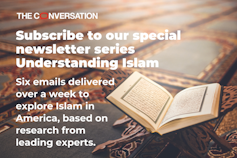Understanding Islam - a brief introduction to its past and present in the United States
- Written by Kalpana Jain, Senior Religion + Ethics Editor
For people who would like to learn more about Islam, The Conversation is publishing a series of articles[1], available on our website or as six emails delivered every other day[2], written by Senior Religion and Ethics Editor Kalpana Jain. Over the past few years she has commissioned dozens of articles on Islam written by academics. These articles draw from that archive and have been checked for accuracy by religion scholars.
For much of my childhood in India, the sound of the adhan – the Muslim call to prayer broadcast from the minaret of a mosque – was what I heard upon waking each morning.
In the shared religious life of my small hometown, we celebrated the festivals of Eid with our Muslim neighbors and they joined us at the time of Diwali, a holiday primarily celebrated by Hindus, Sikhs and Jains. Religious education happened quite informally in these day-to-day interactions.
In my new home in the United States, I learned not many Americans have the opportunity for such daily interactions. A 2017 Pew study[3] found that less than half of the American population[4] personally knows someone who is a Muslim.
This unfamiliarity can often lead to Islam being viewed as a foreign religion – and can even lead to Islamophobia[5].
Former President Donald Trump said in a March 2016 media interview[6], “Islam hates us.” This comment and others by the former president, scholars found, quickly led to an increase in hate crimes[7] against Muslims. Trump also signed an executive order banning nationals from seven Muslim-majority nations[8], further stoking anti-Muslim sentiments[9]. The ban was overturned by President Joe Biden[10] within the first few hours of his taking office.
As an editor of the religion and ethics desk at The Conversation, I have tried to improve the understanding Islam and its long history in the United States, with the help of articles from our scholars.
For example, historian Denise A. Spellberg[11] of the University of Texas at Austin wrote a piece exploring how Muslims first arrived in large numbers to North America as enslaved people during the 17th century[12]. Muslims constituted as much as 30% of the enslaved West African population of British America, though that number is hard to verify. Nonetheless, their presence in the U.S. was so notable that Thomas Jefferson bought a Quran as a 22-year-old law student in Williamsburg, Virginia, 11 years before he drafted the Declaration of Independence. For Jefferson, Muslims were very much part of the United States.
In that same spirit of acceptance and discovery, The Conversation brings you a series of six articles that will explain Islam and its diversity and try to clear common misconceptions.
We will explore the history of American Muslims and gain a deeper understanding of their faith.
This article was reviewed for accuracy by Ken Chitwood[13], a Postdoctoral Research Fellow at the Berlin Graduate School of Muslim Cultures & Societies at Freie Universität Berlin. He is also a journalist-fellow at the University of Southern California’s Center for Religion and Civic Culture.
In the next issue: What do Muslims believe and how do they pray?[14]?
 You can read all six articles in this Understanding Islam series on TheConversation.com[15], or we can deliver them straight to your inbox if you sign up for our email newsletter course[16].
Articles from The Conversation in this edition:
Further Reading and Resources:
You can read all six articles in this Understanding Islam series on TheConversation.com[15], or we can deliver them straight to your inbox if you sign up for our email newsletter course[16].
Articles from The Conversation in this edition:
Further Reading and Resources:
References
- ^ a series of articles (theconversation.com)
- ^ six emails delivered every other day (theconversation.com)
- ^ 2017 Pew study (www.pewresearch.org)
- ^ less than half of the American population (www.pewresearch.org)
- ^ Islamophobia (www.ispu.org)
- ^ said in a March 2016 media interview (www.cnn.com)
- ^ quickly led to an increase in hate crimes (papers.ssrn.com)
- ^ banning nationals from seven Muslim-majority nations (www.federalregister.gov)
- ^ further stoking anti-Muslim sentiments (www.reuters.com)
- ^ overturned by President Joe Biden (www.whitehouse.gov)
- ^ Denise A. Spellberg (theconversation.com)
- ^ Muslims first arrived in large numbers to North America as enslaved people during the 17th century (theconversation.com)
- ^ Ken Chitwood (theconversation.com)
- ^ What do Muslims believe and how do they pray? (theconversation.com)
- ^ Understanding Islam series on TheConversation.com (theconversation.com)
- ^ sign up for our email newsletter course (theconversation.com)

















